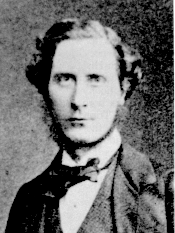| Profile | Major Works | Resources |
Thomas Edward Cliffe Leslie, 1825-1882

Irish legal scholar and historicist economist
Thomas E. Cliffe Leslie was born County Wexford, Ireland, to a family of Scottish descent. Schooled initially by his father, he was sent away to complete his grammar school education in England. He was educated at King's William College on the Isle of Man and enrolled at Trinity College Dublin in 1842, making a mark as a classical scholar, and graduating in 1847, with prizes in ethics and logic (fellow Trinity student J.E. Cairnes would earn the same prizes a year later). Leslie started a career as a lawyer, joining the Irish bar in 1850 and earning an LL.B. in 1851. After further studies at Lincoln's Inn in London, Leslie was called to the English bar in 1857. However, he always took better to academia than the law office, and in 1853 was appointed Professor of Jurisprudence and Political Economy at Queen's University Belfast, a post he would hold until his death.
Cliffe Leslie nurtured from the start an interest in economics - especially applied economics. He was an active member of Dublin Statistical Society, giving Barrington lectures on political economy to the general public in Irish towns in 1852-53. Nonetheless, London remained his primary residence, and Cliffe-Leslie contributed steadily to primarily English magazines and reviews.
Cliffe Leslie demonstrated a historicist bent, derived partly from his own applied work, and partly indirectly from the continental German school (although Auguste Comte was probably a more significant influence). Cliffe Leslie particularly credits lectures given in the 1850s by the English legal sociologist Henry Maine for influencing him, and inducing him to discard abstract natural law theories and seeing the law as an outcome of its historical context. Leslie laid down his historicist gauntlet in his review of Adam Smith for the Fortnightly Review in 1870. He lauds Smith for being a proper inductive economist, constructing his economic theory from a thorough familiarity with the history and facts, and derides David Ricardo and the later Classical school for abandoning that track and replacing facts with abstractions, induction with deduction, real behavior with psychological ideals, etc. He elaborates further in his 1876 critique of Cairnes and elsewhere, famously expounding:
"the abstract and á priori method yields no explanation of the laws determining either the nature, the amount, or the distribution of wealth; ...the philosophical method must be historical, and must trace the connexion between the economical and the other phases of national history" (Cliffe Leslie, 1876: p.295)
Cliffe Leslie's dissatisfaction with Classical economics was already evident in his early economics-related work - most notably on land systems. The Irish Great Famine showed the failure of Classical theory to help understanding the real world, that trying to fit the Irish situation into a pre-existing theoretical model, only yielded wrong conclusions and poor solutions. Rather than demand the extension of English capitalist agriculture, Cliffe Leslie recommended land reform towards small proprietors as the solution to Ireland's problems. (Politically, Cliffe Leslie was an opponent of Home Rule). Cliffe Leslie applied his empirical approach to various other economic questions. He wrote extensively on the statistical relationship between the supply of gold and the price level in the 1870s. In an earlier essay (1863), Leslie expounded an anti-Malthusian demographic transition.
Thomas E. Cliffe Leslie became one of the leading figures, if not the founder, of the English Historical School and a prominent (and virulent) critic of Classical Ricardian theory. One of Cliffe Leslie's criticisms was that it had sidelined consumer behavior and demand. He developed the idea of "consumer sovereignty", but insisted that the analysis of demand should be couched in historical and institutional terms. His heavy-handed criticism of the deductive methods of the Ricardians made an impression, and was very influential on later English historicists like William J. Ashley and William Cunningham.
|
Major Works of Thomas E. Cliffe Leslie
|
|
HET
|
|
Resources on Thomas E. Cliffe Leslie
|
All rights reserved, Gonçalo L. Fonseca
